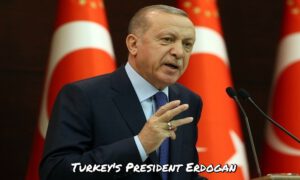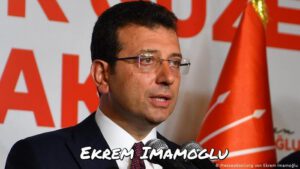by Neville Teller

The polls scheduled in Turkey for May 14, 2023 will combine the election of 600 members of the Grand National Assembly with the election of the President – his re-election, if Recep Tayyip Erdogan, Turkey’s current president, has his way. Yet he is well aware that his standing within the nation is far from secure, and he and his ruling AKP party will be doing all they can in the interim to secure a favourable outcome.
While the Turkish electoral system itself remains notably trustworthy, the campaign environment has been consistently rigged ahead of polls and referenda by the AKP. Their machinations have not always been successful – evidence, it is generally believed, that the electoral system is robust enough to frustrate any attempt to rig the actual results. The Turkish public appears to have confidence in the system, and turns out to vote in large numbers.
Under the current constitution Erdogan is entitled to a further five-year term. His opponents, however, are only too aware that in power Erdogan has form in changing the constitution. He has already revised the role of president and abolished the role of prime minister. He has consolidated his authority by placing the country in a state of emergency over a long period, accruing vastly increased powers in his own hands. He has shut down more than 150 independent media outlets and jailed large numbers of journalists and opposition figures.
To contest the forthcoming elections three main electoral blocs have taken shape: the People’s Alliance, a grouping dominated by the AKP; the Table of Six, a loose assemblage of opposition parties led by the Republican People’s Party (CHP); and the Labor and Freedom Alliance, made up of six Kurdish parties led by the Peoples’ Democratic Party (HDP).
The AKP and its allies, accusing the HDP of having links with the banned Kurdish Workers Party (PKK), have legally challenged the party’s right to exist, and are seeking its dissolution. In the last elections the HDP won nearly 12 percent of the national vote, and holds 56 seats in the 600-seat National Assembly. The party was due to receive $29 million of public funding, in accordance with Turkish law that allows for partial funding to political parties that have received more than 7% of the popular vote in the previous election.
On January 5, Turkey’s Constitutional Court decided to suspend the HDP’s access to the finance it was due until the petition submitted by the AKP to dissolve the party, currently before the court, is resolved. Turkey’s chief prosecutor made his final case in court on January 10.
With the CHP’s very existence under attack, the future of the leading figure in Turkey’s second largest political grouping, the CHP, is also uncertain.
On December 14 a Turkish court sentenced the mayor of Istanbul, Ekrem Imamoglu, to jail for two years and seven months. Imamoglu is the man who inflicted on Erdogan the greatest political defeat he ever suffered, and news of the sentence brought thousands of his supporters out on the streets in protest.
In the municipal elections in 2019 the AKP lost political control to the main opposition party, the CHP, both in the capital, Ankara, and in the nation’s commercial center, Istanbul. In Istanbul the race for mayor descended into a neck and neck gallop to the winning post, and the final result gave CHP candidate, Imamoglu, a lead of 28,000 votes out of the more than 8 million votes cast.
Defeat in Ankara was bad enough, since the AKP had held power in the capital for a quarter century, but defeat in Istanbul, Turkey’s largest city, hit Erdogan particularly hard. It was as Istanbul’s mayor that he began his meteoric rise to power in the 1990s, and he is on record as saying: “whoever wins Istanbul, wins Turkey.”
The AKP appealed against the result, and petitioned for a rerun – a reaction that did not sit well with the electorate. In the new vote Imamoglu boosted his margin of victory 57-fold to win 54.2% of the vote against 45.0%. It was a record in the history of Istanbul local elections.
In a press release, issued in the heat of the political turmoil, Imamoglu referred to members of Turkey’s supreme election council as “fools”. That was enough to get him arraigned on a charge of insulting public officials, to be found guilty and sentenced to a hefty term in prison. He has said that he will appeal, but if the appeals court upholds his conviction he will be debarred from holding any political office. That would hand Erdogan a double win. Not only would it allow him to retake control of Istanbul, but it also would potentially prevent his strongest challenger from running in the June 2023 election.
If Imamoglu’s appeal succeeds, however, he becomes a potent electoral threat to Erdogan. Imamoglu manages to appeal to voters from across Turkish society, including the minority but crucial Kurdish groupings. He is from a secularist party, but is able to recite the Quran in public, attracting religious voters as well. In short he represents what Erdogan fears most – an opposition figure who can serve as a “big tent” candidate. If not stymied by an appeal court confirmation of his conviction, Imamoglu might just pull off his Istanbul achievement on the national stage.
The 2023 presidential election comes as Erdogan’s position in Turkey appears to have weakened, with polls suggesting he could lose to a strong contender. The opposition have yet to announce their candidate in the presidential election. One name suggested was CHP leader Kemal Kilicdaroglu, but a recent public opinion poll indicated that Erdogan would defeat him in a straight vote. According to most public surveys, though, Erdogan is now less popular than either Imamoglu or Ankara’s mayor, Mansur Yavas, both members of CHP.
Erdogan’s popularity problem stems largely from the ongoing economic crisis. Turkey’s annual inflation rate has soared above 80 percent, and much of the electorate blame Erdogan. Whether dubious pre-election efforts to ensure an AKP victory will be enough to overcome Turkey’s widespread economic and financial distress remains, for the present, an open question.

